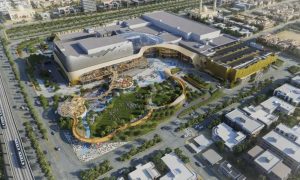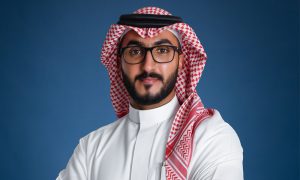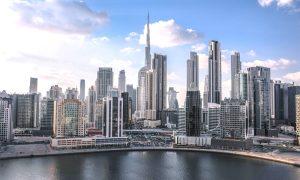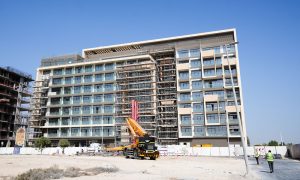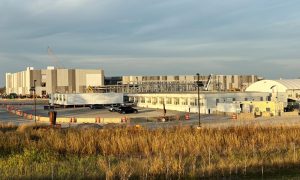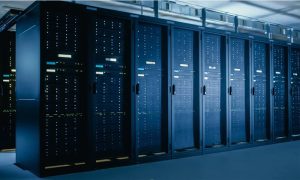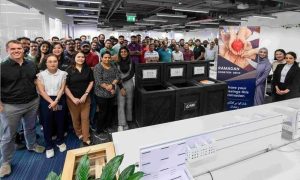INTERVIEW: Hill International’s Imad Ghantous
“When it comes to the Middle East, the elephant in the room is Saudi Arabia”

As market conditions in the GCC region become ever tighter, driven by oil prices and economic strife, clients in the real estate and infrastructure development sectors are becoming increasingly aware of the importance of monitoring costs and controlling expenditure. It is perhaps the best time for a company that specialises in managing construction risk to step up its operations and ambitions in the region, through the introduction of a new strategy and approach to doing business.
This is exactly what Imad Ghantous, Hill International’s new SVP, Strategy and Business Development International – EMEA/APAC, intends to do, following his appointment in March 2018. Operating out of the firm’s Dubai office, Ghantous has been tasked with delivering sales and developing a strategy for business development for a vast swathe of territory, overseeing a region that includes Europe, the Middle East, Africa and the Far East.
He sits down with Big Project ME to discuss his regional ambitions for Hill International and how he is overseeing the firm’s shift towards becoming a one-stop shop for clients looking to rethink the way they build and develop projects.
What are your thoughts on the current market environment? How have client priorities changed in recent years, and how is Hill International adapting to these changes?
This is something of a new trend now, but clients are really trying to control the supply chain, as well as other consultants, designers and contractors. There is a trend towards commoditisation and there is a risk of becoming just another vendor providing services to a client. Because of that, we find that there is now tremendous competition in the market, and that there is a very competitive approach to work in the market. We feel that if this trend continues, a lot of consultants will not be able to provide the right sort of services to a client, because of their requirements.
However, we tend to look at the market in a different way. We do not want to be commoditised and we do not want to be in a position where we cannot bring value to our clients. We believe that in order for us to do that, we must give our clients a continuum of services. We don’t want to just do construction or project management alone, we want to provide a continuum of services from the very beginning, all the way to the end – from formulating a business case for a project through to delivering the project to the client.
We believe that we can bring value to every stage of the development chain, and I think in that aspect, the total is greater than the sum of the parts. We very much believe in this continuum of services and we believe that in order to help your client, the best and highest use comes when you’re hired at the very beginning. That’s when you can influence the end product – if you’re brought in at the end, you can’t really do much. We prefer to be in a position where we’re right next to the client at the very beginning, advising them as the project unfolds and ultimately being in a position where we are our client’s best asset.
That way, they stop looking at us as a regular vendor of services just like anyone else, but start to look at us as an asset that will help deliver them their project. We aspire to be our clients’ development partners.
Has this approach resulted in a change in the way Hill International operates? How will it affect the firm’s current offerings and staff?
The talent and skillsets have always been there, but it’s just been a question of our clients not really foreseeing the benefits of actually getting us on board early enough. That really hasn’t changed how we look at things or who we hire, it’s just that now clients are beginning to realise that the best or highest value is when they bring us on board at the very beginning, and by allowing us to be their developers – because that’s how they get the best out of us.
To be honest, there are clients that have figured it out for themselves, but there are other clients that just don’t know. It’s horses for courses really, it depends on the maturity level of the client that we’re working with, and it depends on the country we’re working in, it depends on who the client is and what the project is.
If you move into an area where there are high barriers of entry, then there won’t be a lot of competitors, and in that sense you can offer a lot of services. You will not be limited by the miniscule fees that would be acceptable. You can go to the client and say, “You can hire us as your developer in the market because we offer all of this. Remember that your project is pretty complex, so do you really want to risk it?”
How does Hill International use technology to help position itself as a solutions provider to clients?
Hill has developed and honed a lot of processes and procedures over the years that are dependent on technology. These are proprietary technologies that we give the client the advantage of using. This is one of our USPs, the ability to offer our clients systems, processes and procedures that have been honed over many years and over many successful projects.
We do use cutting-edge technology when to comes to software and hardware – the use of drones, tablets and all that sort of stuff when on-site, so as to monitor project sites remotely. All of that stuff is not really rocket science when you think about it. it’s basically utilising technology to our advantage.
We think of technology just like owning a calculator – it’s no big deal. We don’t let technology lead us, but we actively use it to promote our practice. This is how we believe we can reach a successful formula, by exploiting technology to advance our practice.
What are your thoughts on the market opportunities in the regions you’re responsible for?
When it comes to the Middle East, the elephant in the room is Saudi Arabia. It’s a big target and it’s project-rich. There are phenomenal projects that have been announced, and we’ve been in Saudi Arabia for a long time – we’ve been managing King Abdullah Financial District for decades now – so we’re very well versed in working in the Kingdom. We have a very good reputation there and we see Saudi Arabia as being the engine of growth in the region. We also believe that the UAE has a lot to offer as well.
We’re focusing on the growth potential of these two markets, but without diverting our attention from other countries like Kuwait, which has significant growth intentions as well. But we believe that the primary growth engines are Saudi Arabia and the UAE, with KSA probably edging it.
In the Far East, we see the engine of growth as India. We’re very much focused on India. It’s a huge market and there’s great potential there, the population is what gives it critical mass. Unfortunately, the price of oil is not helping the economy and is hindering progress, but the government is providing the stimulus to the economy by developing huge infrastructure projects.
Airports, ports and rail projects, these are huge infrastructure projects in the public sector that are keeping the ball rolling, given the pushback from the price of oil. The country has a vision – they do want to become transparent, they do want to fix the whole banking and financing system, and they do want to encourage private-public partnerships, they want foreign investors to come in, but that requires certain things to happen first.
There are realities on the ground that need to be dealt with, but what we do know is that the country has great potential and we want to be a part of it.
In Africa, we are dealing more in North Africa, but South Africa is also promising. There’s a lot of countries that have EU and IMF funding, so we really need to look at the whole continent. There are also a lot of countries that have oil, so there’s a lot of influence from China into Africa, as well as from India into Eastern Africa.
By virtue of being a regional company, we can follow our customers, but the major concentration of work is mainly in Egypt, Morocco and Algeria as well. Libya still doesn’t know what it’s doing at this point, but it has a great future. It has natural resources, and at some point it will calm down and open up again, and we want to be part of rebuilding the country.




